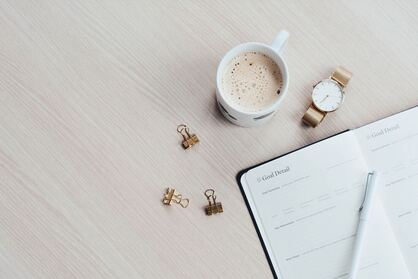Do College Students Have Morning Routines?
By Samantha Hooley
April 24, 2023
Image Credit: Content Pixie for Unsplash
Sophomore behavioral and community health major Cat Gilligan wakes up naturally to the sun shining through the window, beginning her day with a leisurely morning routine.
Gilligan enjoys the time she has before her classes to make breakfast, have coffee, go to the gym and do any remaining assignments. She is often busy with schoolwork and her director of academics position in her sorority Alpha Omicron Pi.
“Having a somewhat structured morning routine every day keeps my life feeling more ordered and at ease,” she said.
Some students find they need morning routines to stay organized and find it vital to their everyday lives; other students do not find benefits in having a morning routine and go with the flow.
Brody Funk, sophomore finance and management double major, also enjoys having time to fully wake up and have a quick breakfast.
“I’m not one of those people who rolls out of bed,” Funk said.
Other students like junior criminology and criminal justice and psychology double major Leslie Sena get ready fairly quickly. She described her morning routine as simple. She gets up 45 minutes before class to enjoy her sleep.
“If I don’t get enough sleep, the structure of my day is affected by me taking a nap later on,” she said.
Even though she loves her sleep, Sena said she wants to add more time to her routine to have breakfast. Funk said he would like to add in more time for exercise.
Gilligan said there is not much she wants to change about her routine, but she learned a lot of her morning routine habits from the book “Atomic Habits,” by James Clear.
Clear’s book explains ways to apply new and better habits and how to alter ones that no longer serve you.
“This book helped me discover the power of forming habits and habit-stacking them to make life easier overall,” Gilligan said.
Habit-stacking is when someone pairs a new habit with a current habit, according to Clear.
On his website, he gives an example of habit-stacking:
“After I pour my cup of coffee each morning, I will meditate for one minute.”
If Gilligan were to add anything, she said she would incorporate meditation into her morning routine. She believes meditation may benefit her mental health, including anxiety.
Meditation has the potential to help issues like anxiety, according to a study published in JAMA Internal Medicine, and is also discussed in an article in Harvard’s Health Blog. Some meditation studies can be skewed by the control treatment and the people who participate in these studies, but Johns Hopkins University dissected many different trials and found the positive results about meditation regarding anxiety, according to the Havard blog.
Morning routines are important to structuring some college student’s lives, while others do not mind not having one at all. For those that do enjoy the structure of routine, by implementing new elements day by day and setting goals a simple routine is possible.
Gilligan enjoys the time she has before her classes to make breakfast, have coffee, go to the gym and do any remaining assignments. She is often busy with schoolwork and her director of academics position in her sorority Alpha Omicron Pi.
“Having a somewhat structured morning routine every day keeps my life feeling more ordered and at ease,” she said.
Some students find they need morning routines to stay organized and find it vital to their everyday lives; other students do not find benefits in having a morning routine and go with the flow.
Brody Funk, sophomore finance and management double major, also enjoys having time to fully wake up and have a quick breakfast.
“I’m not one of those people who rolls out of bed,” Funk said.
Other students like junior criminology and criminal justice and psychology double major Leslie Sena get ready fairly quickly. She described her morning routine as simple. She gets up 45 minutes before class to enjoy her sleep.
“If I don’t get enough sleep, the structure of my day is affected by me taking a nap later on,” she said.
Even though she loves her sleep, Sena said she wants to add more time to her routine to have breakfast. Funk said he would like to add in more time for exercise.
Gilligan said there is not much she wants to change about her routine, but she learned a lot of her morning routine habits from the book “Atomic Habits,” by James Clear.
Clear’s book explains ways to apply new and better habits and how to alter ones that no longer serve you.
“This book helped me discover the power of forming habits and habit-stacking them to make life easier overall,” Gilligan said.
Habit-stacking is when someone pairs a new habit with a current habit, according to Clear.
On his website, he gives an example of habit-stacking:
“After I pour my cup of coffee each morning, I will meditate for one minute.”
If Gilligan were to add anything, she said she would incorporate meditation into her morning routine. She believes meditation may benefit her mental health, including anxiety.
Meditation has the potential to help issues like anxiety, according to a study published in JAMA Internal Medicine, and is also discussed in an article in Harvard’s Health Blog. Some meditation studies can be skewed by the control treatment and the people who participate in these studies, but Johns Hopkins University dissected many different trials and found the positive results about meditation regarding anxiety, according to the Havard blog.
Morning routines are important to structuring some college student’s lives, while others do not mind not having one at all. For those that do enjoy the structure of routine, by implementing new elements day by day and setting goals a simple routine is possible.
|
|
Learn more |
© COPYRIGHT 2020. ALL RIGHTS RESERVED.
|
